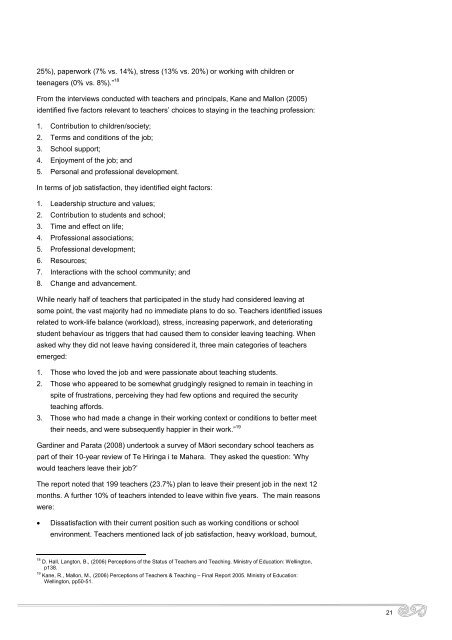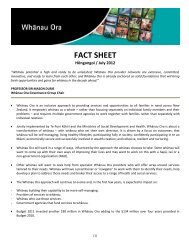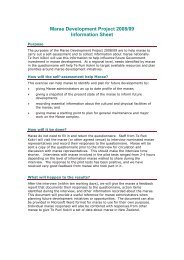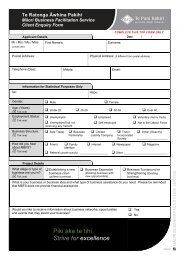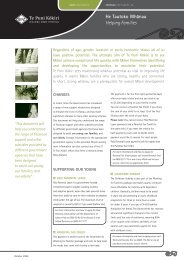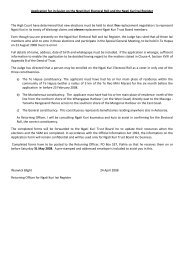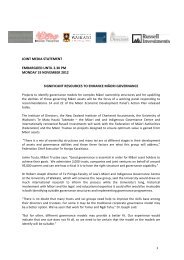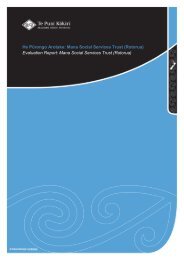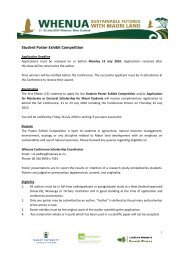The Challenge and DirectionIn 2007, it was reported in two research documents 14 that while New Zealand was a worldleader in the provision of funding for the induction of provisionally registered teachers(PRTs) in schools, there was evidence that not all PRTs were receiving their entitlementto structured programmes of mentoring, professional development, targeted feedback ontheir teaching, and assessment based on the requirements for full registration as ateacher.Investment in professional development in recent years has been weighted towardprimary education. Within secondary education, available professional development hasfocused on supporting implementation of the new qualifications system. The Ministrystated in a report to Cabinet 15 of the need to strengthen the investment and shift theemphasis to improving educational outcomes for secondary students and supportingquality teaching. In line with this intention to shift operational policy and high-levelsystem change, it is important to have some understanding of the context in whichprofessional development initiatives are currently operating. These are highlighted in thefollowing segments.Why teachers choose to stay or leave the teaching professionWhat keeps teachers in their profession? What do they consider to be success andachievement in teaching? If we don’t measure success as becoming a Principal or part ofthe management team, what other measures are there? What makes the job worth it?Kane and Mallon’s Perceptions of <strong>Te</strong>achers & <strong>Te</strong>aching – Final Report (2005) shows thatmotivations for entering into or staying in a teaching career include: “intrinsic motivationsrelated to wanting to work with children, to contribute to society and to do a job of whichthey feel proud, and the degree to which they are encouraged by others.” 16They also note that negative views of the profession have resulted in recruitment andretention issues. For example, many New Zealand senior secondary school students viewteaching as “underpaid, stressful and too ordinary” and teachers themselves are reportedas “tal<strong>ki</strong>ng down the profession”. 17Hall and Langton (2006) undertook a study of the Perceptions of the Status of <strong>Te</strong>achersand <strong>Te</strong>aching, which included the views of Māori adults on the disadvantages ofteaching. They found that “Māori adults were most likely to comment on the low salary ofteachers, and were more likely (although not with statistical significance) than the generaladult sample to do so (30% vs. 21%). Māori adults were less likely than the general adultsample to comment on the disadvantages of a lack of authority (0% vs. 6%), a lack ofrespect or status (3% vs.10%), dealing with social or behavioural problems (17% vs.14 (Anthony, Haigh, Bell, & Kane, 2007; Cameron, 2007) cited in New Zealand <strong>Te</strong>achers Council, (2007). Learning toteach: A survey of provisionally registered teachers in Aotearoa New Zealand.15 Ministy of Education (2007). Report to Cabinet. Realising Youth Potential: Success through Education.Sourced from: www.minedu.govt.nz/.../~/media/MinEdu/Files/TheMinistry/CabPapers/EducationReport6Nov2007.pdf16 R. Kane, Mallon, M., (2005) Perceptions of <strong>Te</strong>achers and <strong>Te</strong>aching, xiii17 Ibid.20 | KIA EKE KI NGĀ TAUMATA, KIA PAKARI NGĀ KAIAKO
25%), paperwork (7% vs. 14%), stress (13% vs. 20%) or wor<strong>ki</strong>ng with children orteenagers (0% vs. 8%).” 18From the interviews conducted with teachers and principals, Kane and Mallon (2005)identified five factors relevant to teachers’ choices to staying in the teaching profession:1. Contribution to children/society;2. <strong>Te</strong>rms and conditions of the job;3. School support;4. Enjoyment of the job; and5. Personal and professional development.In terms of job satisfaction, they identified eight factors:1. Leadership structure and values;2. Contribution to students and school;3. Time and effect on life;4. Professional associations;5. Professional development;6. Resources;7. Interactions with the school community; and8. Change and advancement.While nearly half of teachers that participated in the study had considered leaving atsome point, the vast majority had no immediate plans to do so. <strong>Te</strong>achers identified issuesrelated to work-life balance (workload), stress, increasing paperwork, and deterioratingstudent behaviour as triggers that had caused them to consider leaving teaching. Whenasked why they did not leave having considered it, three main categories of teachersemerged:1. Those who loved the job and were passionate about teaching students.2. Those who appeared to be somewhat grudgingly resigned to remain in teaching inspite of frustrations, perceiving they had few options and required the securityteaching affords.3. Those who had made a change in their wor<strong>ki</strong>ng context or conditions to better meettheir needs, and were subsequently happier in their work.” 19Gardiner and Parata (2008) undertook a survey of Māori secondary school teachers aspart of their 10-year review of <strong>Te</strong> Hiringa i te Mahara. They asked the question: ‘Whywould teachers leave their job?’The report noted that 199 teachers (23.7%) plan to leave their present job in the next 12months. A further 10% of teachers intended to leave within five years. The main reasonswere:• Dissatisfaction with their current position such as wor<strong>ki</strong>ng conditions or schoolenvironment. <strong>Te</strong>achers mentioned lack of job satisfaction, heavy workload, burnout,18 D. Hall, Langton, B., (2006) Perceptions of the Status of <strong>Te</strong>achers and <strong>Te</strong>aching. Ministry of Education: Wellington,p138.19 Kane, R., Mallon, M., (2006) Perceptions of <strong>Te</strong>achers & <strong>Te</strong>aching – Final Report 2005. Ministry of Education:Wellington, pp50-51.21
- Page 1 and 2: Kia eke ki ngā Taumata, kia Pakari
- Page 3 and 4: CONTENTS4 Executive Summary7 Recomm
- Page 5 and 6: that further promotion may be neede
- Page 7 and 8: RECOMMENDATIONSBased on the finding
- Page 9 and 10: 2. BACKGROUNDIn 1999, there were ap
- Page 11 and 12: 3. RESEARCH METHODOLOGYKaupapa Māo
- Page 13 and 14: The following table shows the numbe
- Page 15 and 16: The majority (63%) of teachers part
- Page 17 and 18: Teacher RegistrationOf the total 45
- Page 19: of other professional programmes, i
- Page 23 and 24: competent, confident, skilled, enth
- Page 25 and 26: valuing professional learning, they
- Page 27 and 28: Ako Panuku is the new programme dev
- Page 29 and 30: Resource Teachers: Literacy (Māori
- Page 31 and 32: websites such as Te Kete Ipurangi (
- Page 33 and 34: worthwhile securing and leveraging
- Page 35 and 36: Resource teachers of Māori are by
- Page 37 and 38: Q9 Of the following incentives and
- Page 41 and 42: number of Resource Teachers of Māo
- Page 43 and 44: translating activities and tools fr
- Page 45 and 46: The table below shows the responses
- Page 47 and 48: Child care and family commitments 2
- Page 49 and 50: Impact of professional development
- Page 51 and 52: Informants were also asked about th
- Page 53 and 54: TimingProvided in Māori - atapprop
- Page 55 and 56: Q15 Is there any type of support or
- Page 57 and 58: BIBLIOGRAPHYAitken, H., Bruce Fergu
- Page 59 and 60: http://books.google.co.nz/books?id=
- Page 61 and 62: APPENDIX 1: INFORMATION SHEETPartic
- Page 63 and 64: APPENDIX 2: CONSENT FORMParticipant
- Page 65 and 66: • aroha ki te tangata (a respect
- Page 67 and 68: initially be contacted by phone to
- Page 69 and 70: in-service professional development
- Page 71 and 72:
APPENDIX 4The information presented
- Page 73 and 74:
Option 2 (Auckland): St Dominic’s
- Page 75 and 76:
InterLEAD Consultants, Term One Pro
- Page 77 and 78:
Waikato University - WorkshopUsing
- Page 79 and 80:
http://www.educationanswers.com/sem
- Page 81 and 82:
Time: 9am-3.30pmCost: $980 +GST (in
- Page 83 and 84:
For registrations please email avai
- Page 85 and 86:
http://www.waec.ac.nz/shared/plp/ta
- Page 87 and 88:
Audience: educators and curriculum
- Page 89 and 90:
Venue:Southland Campus, 100 Nelson
- Page 91 and 92:
Delivery and content, plus hands-on
- Page 93 and 94:
Date: Tuesday 31 MarchTiime: 8:30am
- Page 95 and 96:
ctionid=28Manukau Institute of Tech
- Page 97 and 98:
Effective Communications - Communic
- Page 99 and 100:
Ministry of Education: Educational
- Page 101 and 102:
http://www.edgazette.govt.nz/Notice
- Page 103 and 104:
secondary school sector, and can be
- Page 105 and 106:
Contribution to wider school activi


